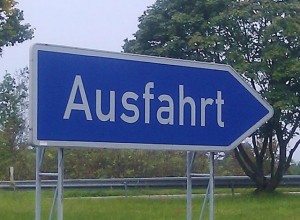What Progress Are You Trying to Achieve by Buying a German Learning Program?
In other words, “How do you want your economic world, your social world and your emotional world to improve as a result of your investment in a German learning program.
Your answer helps us make the lessons you need.
German Learning News
When you go to a restaurant in Germany, a waiter will NOT bring you a complimentary glass of water. In fact, it’s almost impossible to get a glass of tap water in a German restaurant even if you ask for it. Now the tap water in Germany is generally safe . . .
Read More . . .
Before you start studying foreign languages, you tend to think that every language has a way of saying the things that you currently say in your language. However this really isn’t true. What you will find when you learn another language Like German, is that it has ways of saying . . .
Read More . . .
German is very important language. Obviously you are interested in learning German or you wouldn’t be looking at this web page, but here are some great reasons for learning German. Of course not all these reasons my apply to you, but remember the best reason for learning a language is . . .
Read More . . .
The English sentence “I’d like some tea” can be translated into German in three different ways: 1. Ich möchte etwas Tee. (I want something tea – I want some tea, please.) 2. Ich würde gern etwas Tee haben. (I would like something tea have – I would like some tea, . . .
Read More . . .
 If you’ve ever been on a German Autobahn, you’ve seen this sign: To English speakers it is a funny word that sounds a lot like the English word fart. Now…what exactly does the German word “Ausfahrt” have to do with the English meaning of “fart”? To be exact … nothing. . . .
If you’ve ever been on a German Autobahn, you’ve seen this sign: To English speakers it is a funny word that sounds a lot like the English word fart. Now…what exactly does the German word “Ausfahrt” have to do with the English meaning of “fart”? To be exact … nothing. . . .
Read More . . .
Do you realize that whenever you say “a,“ “o,“ “u,” and “i,“ you actually make two sounds, not just one? Say “a” out loud; you just said “aa-eeh.” Try the same with “o” (“aw-ooh”) or “u” (“y-ooh”). English vowels are diphthongs. In German, however, vowels do not consist of diphthongs; . . .
Read More . . .
Most of the consonants in the German alphabet are very much like their English counterparts. A few, though, have striking differences. Others have only very subtle differences, and these are the ones you will want to pay the closest attention to, since the proper pronunciation of these consonants will determine . . .
Read More . . .
 Learn to Speak German Confidently!
Learn to Speak German Confidently! If you’ve ever been on a German Autobahn, you’ve seen this sign: To English speakers it is a funny word that sounds a lot like the English word fart. Now…what exactly does the German word “Ausfahrt” have to do with the English meaning of “fart”? To be exact … nothing. . . .
If you’ve ever been on a German Autobahn, you’ve seen this sign: To English speakers it is a funny word that sounds a lot like the English word fart. Now…what exactly does the German word “Ausfahrt” have to do with the English meaning of “fart”? To be exact … nothing. . . .